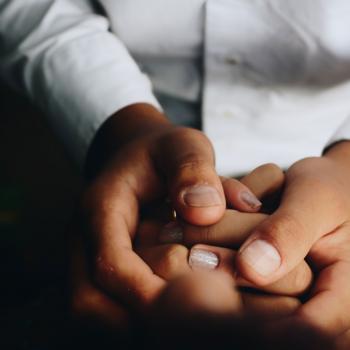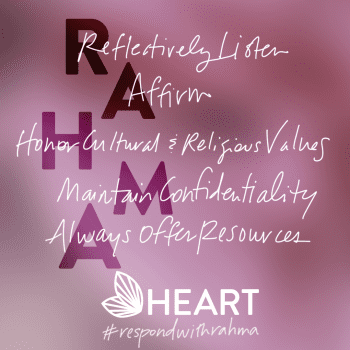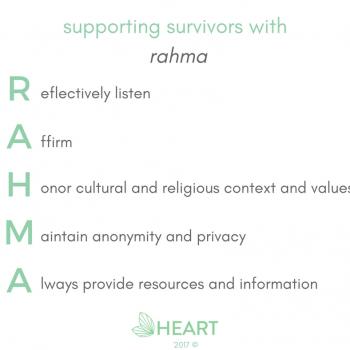by Fatima Noor
Survivors, like me, whether from rape or domestic abuse, silently throw rants of blame against ourselves. The gaze our eyes lay on our reflections is one filled with shame. Our hearts electrocute our bodies with self-disdain with every second that ticks away. The intimate insides of our bodies curse us with feelings of filth. Every cell of our beings screams with questions beginning with who, what, where, when, why and how. Memories raid our minds and sacrifice our little-to-nothing sleep. With seconds of an attack, we, as survivors, become our own worst critics.
rape or domestic abuse, silently throw rants of blame against ourselves. The gaze our eyes lay on our reflections is one filled with shame. Our hearts electrocute our bodies with self-disdain with every second that ticks away. The intimate insides of our bodies curse us with feelings of filth. Every cell of our beings screams with questions beginning with who, what, where, when, why and how. Memories raid our minds and sacrifice our little-to-nothing sleep. With seconds of an attack, we, as survivors, become our own worst critics.
In my previous blog entitled “Confessions Part 1: My Sisters (11)”, I wrote about my conversation with my sisters about my rape. Unfortunately, it failed to go as well as I anticipated. Understandably, they were shocked and some of their words added insult to injury. So, as a follow up, I thought I would discuss in detail about the do’s and don’ts when speaking with a survivor. I put together this list based on my own experience and with help from other organizations, like HEART Women and Girls, Know Your IX and RAINN.
- Don’t demand or even expect to know the details of what happened, who he is or when it occurred. The incident was terrible and the last thing we want is to re-live it all over again. Instead, remind yourself that this is our story and allow us to navigate through it in the manner we believe is right for us.
- On the contrary, if we want to share our story, whether in a public or private forum, don’t throw roadblocks, in the form of guilt-trips and threats, in our way. We may have a desire to help others or this may be a way for us to feel empowered. Rape is an act of control and perpetrators expect and hope that their victims will be hush-hush about it. Talking about the assault is a way for us to get the power back in our hands. So rather than “shushing” us up, help us take back the stolen reigns of our decision-making power so that we may pave the path of our recovery.
- Don’t give us a difficult time or call us “selfish” when we practice self-care. Encourage us to take care of ourselves, especially when it relieves us from the hustle and bustle of our daily chores. Support us to partake in soothing activities such as painting, reading or crocheting. Help us run a few errands so that we may catch a few extra zzz’s. Urge us to try something new, such as learning to play an instrument. Come with us for some recreational activities, like a movie, coffee or bowling. Many of my friends inspired me to write about my trauma and its surrounding issues to help me cope; this blog is a result of the support I received!
- Don’t doubt our sanity or challenge our authenticity with questions or statements like, “are you sure you were raped?” “he doesn’t seem like that kind of guy,” or “this doesn’t make sense.” By doing so, you provoke one of the greatest fears of not being trusted. Rather, believe us and in us and avoid ripping, breaking, damaging or hurting us even more.
- Don’t demean us by questioning “why didn’t you learn from your past?” “what were you wearing?” and “why were you there?” all of which sting and put the blame on us. Rather, console us with warm, welcoming phrases like, “I am sorry” and “it’s not your fault,” which may help replace the intimidating voices of our assailants that threatened our peace of mind.
- Don’t challenge us with questions of what and why we did or did not do something. We were shocked, hurt, confused and scared. We did the best we could considering the severity of the situation. As much as we wish, there is no manual guide that we could flip through in order to deal with the ordeal. Many of us have regrets and we beat ourselves up for the decisions that we did or did not make. If you come along in our life, help us to look forward using what we learned from the past without any blaming and shaming.
- Don’t throw out haunting accusations of “why didn’t you see this coming?” or “this never would have happened if you had done x, y or z.” After all, we are only human and not fortune tellers. If we knew this was our destiny, we probably wouldn’t have been at the wrong place at the wrong time. Instead, hug us, hold our hands and stand by us as we bleed out the agony from within and all around us.
- Don’t get frustrated at our ups and downs that we undergo. One day we will be able to laugh and go out with friends and the next day we could be feeling suicidal. One week, we may not shed a tear, while another week may be filled with sleepless crying nights. Instead, give us positive feedback like “you are doing great” or “it is natural to feel this way.” Be patient with us as we move four steps forward one day and eleven steps back another day.
- If we choose not to talk to you in detail because you are our loved ones, don’t be offended, jealous, angry or cold. Rape is a crime that occurs in private and involves intimate details, making us uncomfortable talking about it, especially to the closest people in our lives. And most likely than not, we don’t want to hurt you. Knowing this, encourage us to seek help with professional therapists and friends or family with whom we are comfortable with. The purpose is for us to heal in the long run. I will be the first to admit that I opted to talk to my friends and therapists over my family members both during the domestic abuse and rape.

- If we pull away from you, don’t ignore us or get upset with us. Chances are we naturally let our emotions get the better of us. Understand the extreme situation and follow up with us, text us, call us, smile at us, sit next to or with us or send us small tokens that show your appreciation with us. After telling one of my good friends about my trauma, she graciously delivered four dozen pinkish-peach blooming roses to my office. Then a few days later, we met up for dinner, where she allowed me to “vent.” These small gestures brightened up my week.
- Don’t undermine the gravity of the trauma based on the details of the assault: number of times the assault occurred (once vs. ten times); relationship with the perpetrator (significant other vs. stranger); length the assailant and victim stayed together (immediate breakup or being together for months after the rape); when it occurred (last week vs. ten years ago); and whether there were use of weapons and/or threats. Rape is traumatic no matter what the surrounding atmosphere is. Being raped by a spouse may be just as disturbing as being assaulted by a stranger. In addition, just because the abuse occurred years ago, doesn’t mean that we have healed. Therefore, always be a supporting friend who will help replace what we lost with joy, laughter and smiles in our lives. The man who raped me never used violence or weapons and I stayed with him for two years after the assault. And dealing with him day after day for that timeframe caused me even more agony and trauma than what I had originally undergone.
- Don’t belittle the incident by linking it to sex, love and intimacy with claims that “it was just sex,” “at least this wasn’t your first time,” “he was expressing his love,” or “take it as a compliment.” Rape is a violation of our body and is a crime of manipulation and power over someone. It doesn’t leave behind feelings of love; it leaves traces of not just physical damage, but mental and emotional as well.
- At the same time, don’t say that we allowed our “nafs” (an Islamic term meaning our selfish desires) to consume us; this is again a form of blame. It was abuse, not any type of desire that fell upon us. Yes, we may have been interested in pursuing a relationship with the perpetrator initially, but there is no correlation between the attack(s) and our desire for a companion or love. When I had initially told someone about my situation, she said that I was desperate for a companion which is why I allowed the rape to occur and why I stayed with the rapist. That pierced my heart so terribly that I refused to confide in her ever again. Understand, rape is a crime and abuse and is never the fault of the victim/survivor.
- Don’t make excuses for the perpetrator, i.e. “maybe he was having a bad day,” “that’s how man was created” or “he was attracted to you.” No, we don’t want to hear these excuses and no, they are not justifiable or valid. Rape is wrong regardless of the reasons.
- Don’t approve the assault just because there was flirting, dating or sexting. Physical touch is not the same thing as words plastered on an email or whispered on a phone call. These shouldn’t even be factored into the equation.
- Do not minimize sexual assault to only instances involving penetration. Sexual assault can occur even if the only kissed the victim or never even saw the victim naked. A violation is a violation despite the degree of it. Rather than focusing on the actual assault or assailant, keep your attention on us survivors and accompany us on our journey of recovery.
- Don’t make decisions for us and don’t corner us into defending the decisions we have previously made. Questions like “why didn’t you tell anybody?” or “why haven’t you filed a report?” are subtle ways of advising us on what we should or should not do. As an alternative, allow us to be the driver of our healing, moving in the direction we choose. Of course, give us advice if we ask you, but never force us into things we don’t want to or stop us from taking certain courses of action that we want to. Some of us may choose to file a police report, while others may choose to become an activist and even others may want to put the past behind them to simply heal.
- Don’t share our story with others, even if it is with another family member, without our permission. It was an honor for you (and not your right) that we revealed this personal aspect of our life to you. We confided in you because we respect and trust you so please reciprocate that respect and trust. It is our story, our life and our trauma; let us unveil it the way we want, when we want, to whom with want, in the manner we want and with the details we want.
- Don’t avoid us, treat us differently, view us as damaged goods or make us feel like a burden. We need all the support and love we can get because there is no cast to heal our broken trust, bandage to hide the pain or glue to put back our shattered hearts. One of the comments I had heard during this ordeal was “you’ve done enough to your family” (ouch). That was one of the most gut-wrenching allegations that stabbed me in my heart. We appreciate souls who can be my constant sanctuary enveloping me in their pure goodness, trust and love.
- Don’t spout out statements such as “God is punishing you” or “God wanted this to happen.” When life fails us, all we have is our faith in God. When you paint God as the one who caused this, although we know deep down He is the planner of all things, it doesn’t help. We want to see Him as our savior, not as one who harms us. As an alternative, pray with us and for us. Together, we can ask Him to cocoon our hearts, minds, bodies and souls to make our healing easy, quick, painless, special and beautiful.
- Don’t ask us to be the better person and forgive the rapist. He doesn’t deserve any empathy or forgiveness especially when he doesn’t even seek forgiveness or acknowledge that he did anything wrong. Forgiveness may or may not happen considering something so precious was stolen from us. Leave it up to us to forgive or not as we go through our healing process. It has been two years since I was raped and 28 years since I was sexually molested and I still cannot forgive those men.
- Don’t pester us to “get over it,” “put it behind” us or “stop thinking about it,” regardless of whether it has been one year or 20 years since the trauma. Realize that each soul is distinct, has different strengths and weaknesses and lives with unusual surroundings and varying degrees of a support system. Some of us know and trusted the attacker, while others didn’t. Some of us continue to live within the same vicinity as he does whereas others live across the country. Some of us have nearby friends and family to support us, while others do not. Some of us have access to counseling and others have nobody to talk to. In addition, the after effects of rape haunt us like a shadow for the rest of our lives, so most of us will never really get over it.
- Don’t insensitively make claims that it could have been worse and tell us to be thankful with comments like “at least you’re not dead.” Yes, that is ultimately true. At that time, though, death would have been a better alternative than living through this grief. And at that moment, the gravitational pull of our pain is so strong that we cannot fathom there could be a worse situation than ours. As an alternative to this, help us count our blessings of health, a job, loved ones and anything that is positive to keep our chin up without harshly telling us to be grateful.
- Never think our loss is not a loss, saying “it’s not like you lost anything.” Yes, we did lose something! And that thing is far more precious than money. Just because our dignity is not valued through dollar signs does not mean it is not a loss.
- Don’t stereotype us as “that” type of woman. There is no one kind of woman who gets raped. Instead, degrade that horrendous act and help us see our strengths, like our character, personality, inner and outer beauty and intelligence.
- Don’t attempt to understand the rape and/or abuse or the emotions tied to it. An outsider who is watching or listening to the abuse unfold will not and cannot understand what led to the assault or why, we stayed, if we did, with the perpetrator. Even we, the survivors cannot comprehend or digest anything when we are tangled up in the trauma. The confusion, shock and weakness consume us and make our life a jigsaw puzzle that awaits to be put together. Instead, be our lifeline to whom we talk to when and if we need it.
- Don’t claim to know what we are going through. Your spat with your significant other, the work politics that you faced last week, your bad hair day or not having gotten the 2% raise that you were expecting are not valid comparisons to the ordeal that we have been through. Instead, acknowledge the gravity of our pain, don’t pretend to think you know our agony and actually tell us you have no idea what we are going through.The antidote to our pain is not to shame, blame, shun, scare, lecture or guilt-trip us, as we already do a spectacular job of this ourselves. Instead, support us, honor us, love us, console us, commend us, elevate us, encourage us, talk with us and make it about us: for once, let it be victim-centric. Be our moon that is always ever-ready and present to radiate in the darkest of moments with your illuminating light and intensifying beauty regardless of whether we acknowledge you or not.
This post was originally published on the author’s personal blog, Echoes of Her Voice.
















